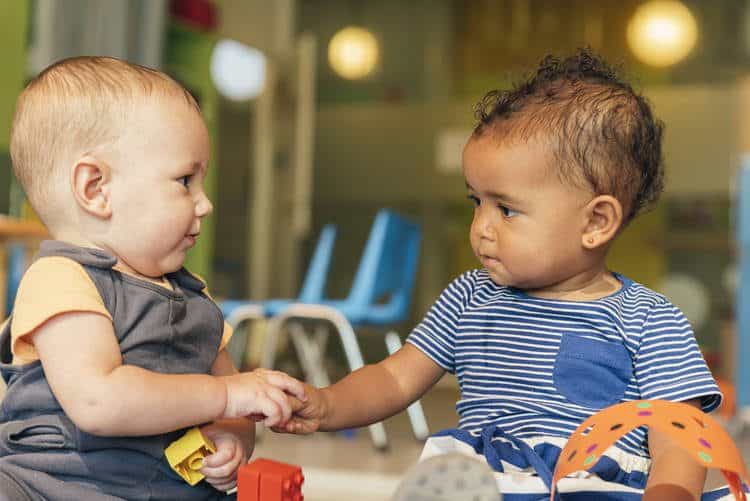Learning to share with grace is a long process. Here’s how to turn moments of struggle into rich opportunities to help children learn critical skills.
Imagine the scene: a 3-year-old and a 2-year-old happen upon a pile of toy trains. The younger child picks up two of the trains. Instead of picking up any of the remaining trains, the older child reaches over to grab the trains the younger child is holding. The 2-year-old grabs them back—knocking the other child off balance—and both children start crying.
Why is learning to share so hard?

For one, children this age haven’t developed the ability to put themselves in another’s shoes yet. This doesn’t mean your child is a bad person, or that you’ve failed as a parent. Children this age are focused on their own feelings and thoughts, and they’re thinking, “I want those trains, and I want them now!”
This behavior may embarrass and frustrate parents, but an unwillingness to share is perfectly normal at this age! In Tuning In, ZERO TO THREE’s national parent survey, 43% of parents surveyed thought that children should be able to master sharing by age 2. In fact, these skills develop between 3.5 to 4 years old. Knowing what to expect can help parents manage their expectations and their frustration when they see children having difficulty with turn-taking.
What You Can Do

There are many ways to support young children in learning to share. Here are a few suggestions to try. Some approaches may work better than others, depending on the situation and your child:
Ensure safety. When young children feel threatened (like when a friend tries to snatch their toy!), they often respond in an aggressive way. That means grabbing, hitting, and throwing things. When this behavior occurs, move in close and stop the aggression. A simple statement in a low voice such as, “I can’t let you hit,” or “No grabbing,” shows your calm authority.
Narrate or “sportscast” the situation. “Two children who both want the same trains! Sam, you picked them up and then Jade grabbed them. Sam, you tried to get them back and now you’re both crying.” Sometimes slowing things down and creating a space for calm problem-solving is a great beginning.
Offer a “long turn.” In some instances, a child can be given a long turn with a toy. “Take as long as you like with those trains, Sam, and Jade will wait for you to be done. Jade, would you like to play with these trains over here until Sam is done?” Sometimes it can feel to children that as soon as they start to play, a peer demands to “take a turn.” It is okay to let children have a “long turn”—a chance to play with the toy—before they share. Help the other child wait by offering a different activity.
Use a timer or clock. In some cases, letting a child decide when their turn will be over just isn’t practical. At those times, a timer or clock can be a helpful rule-keeper and visual aid. The great thing about the timer is that it’s not the adult telling the children when to share, it’s the “bell.”
Reflect the feelings. When struggles happen, it’s important to acknowledge how both children feel. “You took that train because it looked like so much fun to play with.” Then, help the other child with his feelings by showing empathy: “He picked those trains up first so he gets to play with them for now. You can have a turn later. It’s OK to be upset when you have to wait. Waiting is hard!”
Provide “emotion-coaching.” It’s usually the child who is waiting for a turn who is having big feelings. Sometimes this means listening to a child’s temporary emotional meltdown. Her disappointment, though out-of-proportion to an adult’s eyes, feels very real! When a child’s emotions are understood and validated, it helps her learn to put herself in others’ shoes and move on to the next step—finding solutions.
Guide children to come up with solutions. Help them brainstorm ways to work it out—but also ask their opinions. Don’t underestimate children’s ability to come up with great ideas and strategies. For example, you can ask: “We need to stir the batter for our cookies, but I only have one spoon. What should we do?” The more we empower children to be kind, compassionate, problem-solvers, the more likely they will be just that.
Offer social information and a vote of confidence. In the heat of the moment, children under 3 won’t be able to hear corrective feedback about their behavior. Once everyone is calm, a short statement about expectations will help children learn new behaviors. You could say, “Next time you want something, you can say, ‘Can I have a turn?’ Grabbing and pushing aren’t safe. Next time, you can ask first. Keep practicing.”
Learning to share with grace is a long process. Even some adults are still working on it! Rather than dreading moments of struggle between children, consider them to be rich opportunities to help children learn critical skills—in this case, self-regulation, empathy, and conflict resolution—all of which will help them become better at sharing.



